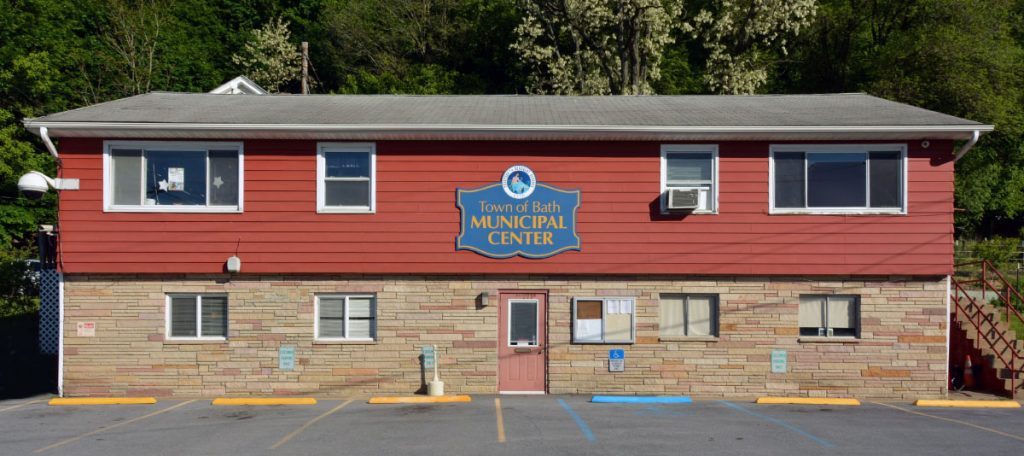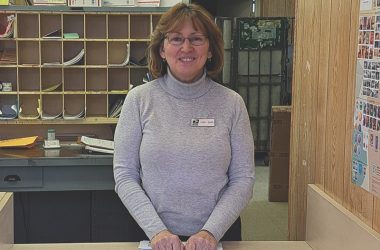by Trish Rudder
It took the Bath Town Council about 10 minutes to vote “No” at its special meeting on Tuesday, May 25 regarding the town Historic Landmarks Commission’s request to add certificates of appropriateness to the town ordinance.
Recorder Susan Webster made a motion to take no action on the commission’s request to change the town ordinance, and her motion passed 4-2, with support from council members Elizabeth Skinner, Chris Chapman, Webster and John Bohrer.

Councilman Chis Chapman said he was leaning for allowing the certificates of appropriateness, but his concern was that the state law said violations to the certificates were punishable by fine or imprisonment in jail.
“I can’t see going to jail for something you want to do on your property,” he said.
After the vote, Mayor Scott Merki said he hoped in the future a historic district and certificates of appropriateness “will happen someway or somehow.”
David Abruzzi, the HLC president had already told the council members that he would resign his position if the council voted no to his group’s request.
“With the town council’s vote to deprive affected property owners a direct vote, it is also a vote to end the HLC. The HLC members are in agreement to disband and direct our individual efforts elsewhere,” he said in an email on Friday after the Thursday, May 20 meeting.
Regarding any support from property owners that want the HLC to go forward, Abruzzi wrote: “I’m afraid that support was drowned out last night by the negative comments made by those who in no way will be affected by this since the properties they own would be outside the boundary of any proposed district.”
A public meeting at the Ice House for May 20 was held to let the public weigh in on whether the council should adopt changes to its HLC ordinance by adding certificates of appropriateness.
An amended ordinance was needed to move forward and establish a smaller local historic district.
About 50 people attended the meeting, which was facilitated by Sally Marshall, who co-chairs the town Streetscapes committee.
Most of the comments were against the HLC proposal to add certificates of appropriateness.
Abruzzi said of the 26 people who spoke, only six were property owners within the proposed district — Union to Fairfax streets and Wilkes to Green streets.
Town resident Tina Byers said, “I am opposed.”
She said the county already rejected zoning. The audience applauded her remarks.
Byers’ building on Wilkes Street is a non-contributing structure and would not be affected by the certificates of appropriateness, Abruzzi said.
Abruzzi said much of the public meeting discussion was misdirected at attacking a first draft of an ordinance that he drafted months ago.
He said the council and the ordinance committee “repeatedly ignored the HLC’s request to meet and begin the writing process.”
“The draft was a “cut and paste” from the state law (as is the current HLC ordinance) since any ordinance has to begin somewhere. The hope was to meet with the ordinance committee and use that as a starting point and develop an actual ordinance to fit the needs of the Town of Bath,” he said.
The Bath council voted 4-2 to post the draft document on the town’s website so the public could see it.
Abruzzi said the early draft, plus other documents being circulated around town, “served to derail the meeting.”
Biser Street resident Ellen Lachewitz said she was in favor of the HLC going forward. She attended the meeting and she wrote to the town council and asked them to vote to approve the HLC process going forward.
“This will give the affected property owners the ability to vote on whether to move forward with a designated Historic District. The affected property owners deserve the right to make their voices heard by voting their disapproval or by not voting – their approval,” Lachewitz wrote.
Abruzzi said that voters will have 30 days to respond to the registered mail notification if they are against the proposal. If they want the proposal to be approved, no action is needed, which is in the state code.
Morgan County Commissioner and Insurance Agent Sean Forney said having a property designated as a historic landmark results in higher insurance rates.
Studies show that the property value goes up with a historic landmark designation, Lachewitz said.
Town resident Rebecca MacLeod sent written comments to the town council:
“Like you have, I have researched the benefits and disadvantages of establishing a historic district within the town limits. I listened to the HLC volunteers who put in long hours studying policy and procedures on how to accomplish the goal you gave them when the Bath Council established a Landmarks Commission five years ago.”
MacLeod said she reread the Town Comprehensive Plan, which specifies that the town would “Support programs that maintain the historical nature of the town.” The plan further says a strategy to do that would include the step to “Educate historical property owners of programs that encourage historic protection.”
“You approved the Comprehensive Plan because it reflected what many of our businesses and residents told us were needed for economic viability during the many hours of conversations and meetings it took to develop the plan.
“We heard that keeping the town as a prosperous tourist destination is a top priority. The investments made by residents and business to maintain that economic foundation needs to be protected and promoted. The threat that eyesores and nuisance businesses cause when they gain footholds in our historic neighborhoods happen now without any due process or review,” MacLeod wrote.
She said fears about increased taxes and insurance were being spread too widely.
“I believe the protections afforded by the historic district far outweigh any negative points. If I could, I would gladly put my 87-year-old house in the district, and I hope and believe most property owners wanting to protect their valuable assets would as well. After all, without any protection your neighbor or some non-resident investor has the power to wipe out your property value in a day. I would rather trust town government to protect my investment than some of the tightfisted, short-sighted people I heard at last week’s meeting,” MacLeod wrote.
Recorder Susan Webster’s husband, Pete Moss, said he’s “all in” if the HLC is to be an advisory entity, but the law stating, “what I can or cannot do, my attorney is the first one I’ll call.”
Downtown business owner Barb Wolfe said many people who visit her shop tell her they are thrilled the town structures have been maintained.
“They are very positive about the history,” she said.
Wolfe said her sister, the late Jeanne Mozier, promoted the Town of Bath and Berkeley Spring for 42 years. She said Mozier was also a member of the HLC.
“Once you get rid of something, it does not come back,” Wolfe said.
Gavel slamming on May 18
Leading up to the council’s decision on May 25, a May 18 town council meeting was strained.
Town Recorder Susan Webster, who chairs the town’s Ordinance committee, has been outspoken against the HLC’s certificate of appropriateness addition and she invited townspeople to speak against the proposed changes.
Mayor Scott Merki would not allow it, stating a special meeting on May 20 was where people could speak on the subject, not at the regular council meeting.
He slammed his gavel more than once during the exchange with Webster, who pushed the issue.
“There is nothing to discuss tonight regarding the HLC,” he said.
“So, you are going to turn these people away?” Webster asked.
Merki answered that he was. “We have a meeting set up and we are not arguing this tonight,” he said.
Webster pursued the argument with “I have to say something.”
Merki said “No, no, Susan, absolutely not.” He told her she had stirred things up by the ad she placed in The Morgan Messenger which was not approved by the town council.
Webster signed the ad against the HLC proposal with her titles as town recorder, Economic Development Authority (EDA) member and Bath Development Authority (BDA) member.
The town BDA president, Lisa Stine, told the council that Webster’s statements in the newspaper were not approved by the BDA. What Webster wrote in the ad, “were not the feelings of the BDA,” Stine said.
Webster asked that the draft proposal from the HLC be put on the town’s website, which the town has never done before.
Merki said no, and Webster’s husband accused Merki of trying to hide something.
Merki tried to move on, but Webster wanted the council to vote to put the draft ordinance on the website, which it did after voting 4-2 in favor.
Abruzzi said later that the draft was a “cut and paste” document from the state’s guidelines and was not what the updated ordinance for the town would be.
He said he gave that to Webster “in good faith,” not realizing it would be used against him or the HLC.
The HLC has been working toward an agreement with the town since 2017.









